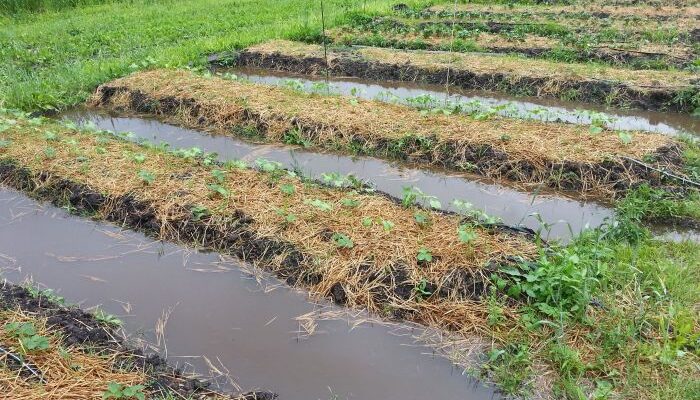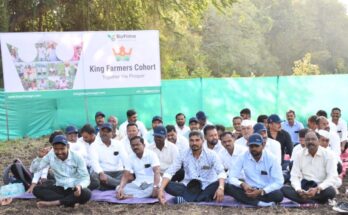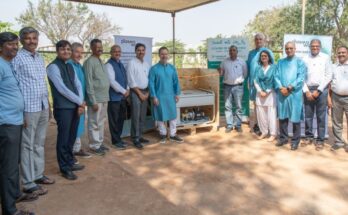In order to combat the adverse impact of climate change on agriculture, the Department of Agriculture & Farmers Welfare (DA&FW) is implementing Crop Diversification Programme (CDP) under Rashtriya Krishi Vikas Yojana – Remunerative Approaches for Agriculture and Allied Sectors Rejuvenation (RKVY-RAFTAAR) to divert the area of water-intensive paddy crop to alternative crops like pulses, oilseeds, coarse cereals, nutri cereals, cotton among other crops. Further, Government of India supplements the efforts of state governments to encourage diversified production of crops such as pulses, coarse cereals, nutri cereals and cotton under the National Food Security Mission (NFSM) and high-value horticultural crops under Mission for Integrated Development of Horticulture (MIDH), Union Minister of Agriculture and Farmers’ Welfare, Narendra Singh Tomar said in a written reply in the Rajya Sabha on Friday.
Pradhan Mantri Krishi Sinchayee Yojana-Per Drop More Crop (PMKSY-PDMC), also focuses on increasing on-farm water use efficiency by promoting efficient water application systems such as drip and sprinkler irrigation systems. For sustainable development of agriculture and enhancement of fertility of the soil, Government is promoting organic farming through the schemes of Paramparagat Krishi Vikas Yojana (PKVY) and Mission Organic Value Chain Development for North Eastern Region (MOVCDNER), the minister informed the upper house of Indian parliament.
You may also like to read: What are the Government initiatives on research and development in organic fertilisers? Read here…
Natural farming through a sub-scheme namely Bharatiya Prakritik Krishi Paddhati (BPKP) under Paramparagat Krishi Vikas Yojana (PKVY) promotes on-farm biomass recycling with major stress on biomass mulching, use of on-farm cow dung-urine formulations from local livestock, Tomar informed.
Under these schemes, assistance is provided for various inputs such as the distribution of improved climate-resilient seeds and hybrids, improved farm implements and machines, water-saving devices, plant protection chemicals and soil ameliorants. Further addressing the impact of climate change, Government of India and states ensure promoting farmers’ awareness on judicious, timely and effective use of inputs, soil test-based balanced and integrated nutrient management through conjunctive use of both inorganic and organic sources of plant nutrients, adoption of better agronomic practices and improved production technologies for sustainable agriculture through crops demonstrations, training, extension, capacity building programmes and advisories on farm activities by ICAR (Indian Council of Agricultural Research) and stakeholder institutes, the agriculture said in the parliament.
You may also like to read: IITM Pravartak, WayCool Foods join hands to bring regenerative agriculture tech stack to farmers
Government of India also provides flexibility to the states for state-specific needs and priorities under RKVY. The states can promote these activities under RKVY with the approval of State Level Sanctioning Committee (SLSC) headed by the chief secretary of the respective states, Narendra Singh Tomar added.
Focusing on combating climate change, ICAR institutions have developed and released 1,888 varieties tolerant to one or more biotic and or abiotic stresses. ICAR–Central Research Institute for Dryland Agriculture (ICAR-CRIDA) also prepares the District Agriculture Contingency Plan (DACP) to mitigate the impact of weather-related challenges, and circulates it to all states’ agriculture departments, he informed the Rajya Sabha.
You may also like to read: Cargill, TechnoServe partner to bring 25,000 acres of maize farms under regenerative agriculture program
The plan contains suitable technology interventions including recommendations on the use of crop varieties, and seeds tolerant to biotic and or abiotic stresses. In order to overcome the natural calamities and unforeseen conditions, the DA&FW is implementing the component National Seed Reserve under Sub-Mission on Seeds & Planting Materials (SMSP). Under this, seeds of short and medium-duration crop varieties are kept to meet the requirement of quality seeds during natural calamities and unforeseen conditions i.e. drought and floods, Tomar further said.
The Department of Agriculture & Farmers Welfare organises pre-seasonal interface meetings between DA&FW and ICAR, wherein discussions are held on the technical recommendations, and measures provided by ICAR against the crop-specific critical issues and the latest technology. The outcomes of these interactions are shared with the states and other stakeholder institutes during the national conferences organised before each season namely, Kharif, Rabi and Zaid conferences, the agriculture minister concluded.





